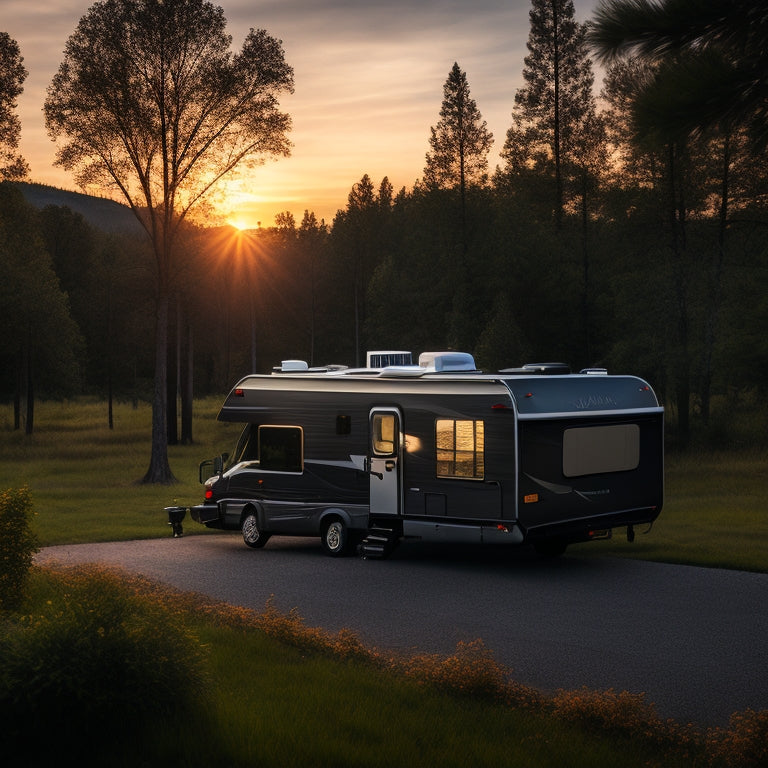
What Is the Best Solar Battery for Rvs?
Share
When selecting a solar battery for your RV, you should take into account your specific energy needs and priorities. Evaluate your daily energy usage, appliance wattage, and frequency of use to determine the necessary capacity for energy independence. Top brands like Battle Born, Renogy, and SimpliPhi Power offer reliable lithium-ion options, while Trojan, East Penn Deka, and Rolls-Surrette provide trustworthy deep cycle batteries. Take into consideration factors like Ah capacity, cycle life, and maintenance requirements to make an informed decision. As you explore your options, you'll discover the perfect balance of performance, longevity, and cost-effectiveness for your RV solar system.
Key Takeaways
• Assess specific energy needs to determine the required battery type and size for reliable power storage in RVs.
• Lithium-ion batteries from brands like Battle Born, Renogy, and SimpliPhi Power offer superior performance and longevity for off-grid living.
• Consider daily energy usage, appliance wattage, and frequency of use to calculate necessary capacity for energy independence in RV solar systems.
• Choose a battery with a suitable Ah capacity based on daily energy requirements, solar array size, and depth of discharge for efficient energy storage.
• Maintenance-free designs from brands like FullRiver, Battle Born, and SimpliPhi offer hassle-free power storage with reduced maintenance and improved durability.
Understanding Solar Battery Needs
When it comes to choosing a solar battery for your RV, identifying your specific energy needs is crucial, as it directly impacts the type and size of battery you'll require. You'll need to assess your power priorities to make sure you're meeting your energy demands. This means considering your daily energy usage, including the number of appliances you'll be running, their wattage, and the frequency of use. This calculation will help you determine the necessary capacity and type of solar battery that'll provide you with energy independence.
To achieve energy independence, you'll need to prioritize your power needs. Start by categorizing your appliances into essential and non-essential items. Identify the must-haves, such as lights, refrigerators, and laptops, and allocate your power accordingly. This will help you allocate your energy resources efficiently, ensuring you have a reliable power supply when you need it most.
Top Brands for RV Solar Batteries
When exploring the market for the best solar battery for your RV, you'll want to assess top brands that offer reliable and efficient energy storage solutions.
You'll find that top manufacturers provide a range of options, including lithium-ion batteries for high-performance needs, deep cycle varieties for extended off-grid adventures, and maintenance-free designs for hassle-free maintenance.
Lithium-Ion Options
You'll find that lithium-ion batteries from top brands like Battle Born, Renogy, and SimpliPhi Power offer a significant upgrade in performance and longevity compared to traditional lead-acid batteries for your RV solar setup. These top brands provide reliable power storage solutions that cater to your off-grid adventures.
Here's a comparison of some top lithium-ion battery options for your RV:
| Brand | Capacity | Warranty |
|---|---|---|
| Battle Born | 100Ah, 200Ah, 300Ah | 10-year warranty |
| Renogy | 100Ah, 200Ah, 300Ah | 5-year warranty |
| SimpliPhi Power | 98Ah, 170Ah, 280Ah | 10-year warranty |
| Lithium Werks | 100Ah, 200Ah, 300Ah | 5-year warranty |
When it comes to lithium-ion batteries, you can expect superior Lithium Durability and Ion Innovation. These batteries are designed to withstand the demands of off-grid living, providing a reliable source of power for your RV. With their high energy density and long cycle life, you can enjoy boondocking without worrying about running out of power.
Deep Cycle Varieties
For RVers seeking a more affordable and established technology, deep cycle batteries from top brands like Trojan, East Penn Deka, and Rolls-Surrette offer a reliable and time-tested solution for your solar-powered adventures.
These deep cycle batteries are designed to provide a steady flow of energy over an extended period, making them ideal for RV applications.
When it comes to battery durability, Trojan's deep cycle batteries stand out for their exceptional lifespan, with some models lasting up to 10 years.
East Penn Deka's deep cycle batteries, on the other hand, boast impressive cycle performance, with some models capable of withstanding up to 1,200 cycles.
Rolls-Surrette's batteries, meanwhile, offer a unique blend of high-capacity energy storage and exceptional durability.
With these top brands, you can rest assured that your RV's solar power system will perform consistently and efficiently, even in demanding off-grid environments.
Maintenance-Free Designs
When it comes to minimizing upkeep and maximizing convenience, maintenance-free solar batteries from top brands like FullRiver, Battle Born, and SimpliPhi offer a compelling solution, providing RVers with a hassle-free power storage option that's specifically designed to integrate seamlessly with their solar panel systems.
These maintenance-free designs boast sealed batteries with waterproof designs, guaranteeing that they can withstand the rigors of the great outdoors. This means you can focus on enjoying your RV adventures, rather than worrying about your battery's performance.
Here are three key benefits of maintenance-free solar batteries:
-
Reduced Maintenance: With sealed batteries, you'll never have to worry about checking or replacing electrolytes, saving you time and hassle.
-
Improved Durability: Waterproof designs ensure that your battery can withstand the elements, providing reliable power storage even in harsh conditions.
-
Enhanced Safety: Maintenance-free designs minimize the risk of acid spills or electrical shocks, giving you peace of mind on the road.
Types of Deep Cycle Batteries
Deep cycle batteries, the heart of your RV's solar power system, come in several types, each with its own strengths and weaknesses. As you explore the best solar battery for your RV, it's essential to understand the different types of deep cycle batteries available.
When it comes to battery chemistry, you'll encounter flooded, gel, and absorbed glass mat (AGM) batteries. Flooded batteries, the most common type, use a liquid electrolyte solution and require regular maintenance. Gel batteries, on the other hand, use a gel-like electrolyte, making them more durable and low-maintenance. AGM batteries, with their absorbed electrolyte, offer superior performance and reliability.
In terms of battery construction, you'll find monoblock and modular designs. Monoblock batteries house multiple cells in a single casing, while modular designs feature separate cells connected in a series. Modular batteries provide greater flexibility and customization options.
Understanding these variations will help you choose the ideal deep cycle battery for your RV's solar power system, ensuring reliable energy storage and efficient performance.
Lithium-Ion Vs Lead-Acid Batteries
You're likely weighing the pros and cons of lithium-ion batteries versus traditional lead-acid batteries for your RV's solar power system. This decision ultimately comes down to understanding the fundamental differences in battery chemistry and the cost implications of each option.
When it comes to battery chemistry, lithium-ion batteries have a clear advantage. They offer a more efficient charge and discharge cycle, resulting in a longer lifespan and reduced maintenance costs. In contrast, lead-acid batteries rely on a more traditional flooded battery design, which can lead to reduced performance and a shorter lifespan.
Here are three key points to ponder when comparing lithium-ion and lead-acid batteries:
-
Cycle Life: Lithium-ion batteries can handle up to 5,000 charge cycles, while lead-acid batteries typically max out at around 300-500 cycles.
-
Depth of Discharge (DOD): Lithium-ion batteries can handle up to 80% DOD, while lead-acid batteries are typically limited to 50% DOD.
-
Cost Comparison: While lithium-ion batteries are more expensive upfront, their longer lifespan and reduced maintenance costs make them a more cost-effective option in the long run.
Ah Capacity for Off-Grid Systems
As you design your off-grid solar power system, selecting the right Ah capacity for your battery bank becomes essential to guarantee you have a reliable and efficient energy storage solution.
Off-grid reliability is highly dependent on the Ah capacity of your batteries, as it determines how long your system can sustain itself during periods of low sunlight or heavy energy usage.
When it comes to energy independence, the right Ah capacity assures you can power your RV's essential systems without relying on external power sources.
To determine the ideal Ah capacity, consider your daily energy requirements, the size of your solar array, and the depth of discharge (DOD) you're comfortable with.
A higher Ah capacity provides a buffer against unexpected energy shortfalls, but also increases the overall cost and weight of your battery bank.
A balanced approach is key, as you want to make sure your system can meet your energy demands without breaking the bank.
Charge and Discharge Cycles
When you're shopping for a solar battery for your RV, it's crucial to take into account the charge and discharge cycles, as they greatly impact the battery's performance and lifespan.
You'll want to assess the cycle life expectancy, which refers to the number of charge and discharge cycles a battery can handle before its capacity degrades. Additionally, you'll need to examine the depth of discharge (DOD) and charge retention rate to make sure the battery can meet your off-grid energy needs.
Cycle Life Expectancy
Your RV's solar battery will go through a finite number of charge and discharge cycles before its capacity starts to degrade, making cycle life expectancy a critical factor in determining the overall lifespan of your battery.
This is because each cycle causes subtle changes in the battery's chemistry, impacting its ability to hold a charge over time.
To guarantee you get the most out of your solar battery, look for models with a high cycle life expectancy. Here are some key considerations:
-
Battery Durability: A more durable battery will withstand power fluctuations and last longer, providing a higher number of charge and discharge cycles.
-
Depth of Cycle: A battery that can handle deeper discharges will naturally have a shorter cycle life expectancy than one that's designed for shallower discharges.
-
Manufacturing Quality: A high-quality battery from a reputable manufacturer will typically outlast a cheaper alternative, even with similar specifications.
Depth of Discharge
By understanding the depth of discharge, you'll be able to maximize your solar battery's lifespan by minimizing the number of charge and discharge cycles it goes through. Depth of discharge (DOD) refers to the percentage of a battery's capacity that's used before recharging.
A deeper DOD means more of the battery's capacity is depleted, which can reduce its overall lifespan. For RV owners, striking a balance between daily cycles and battery health is crucial.
Aiming for a moderate DOD of around 50% is a good starting point. This allows you to use half of your battery's capacity daily, ensuring you have enough power for your needs while keeping the number of charge and discharge cycles in check.
However, if you consistently deplete your battery to 80% or more, you may be reducing its lifespan. To mitigate this, consider installing a battery monitoring system, which can alert you when your DOD reaches a certain threshold, prompting you to recharge your battery.
Charge Retention Rate
As you balance your daily energy needs with the health of your solar battery, you'll also want to take into account its charge retention rate, which is directly tied to the number of charge and discharge cycles it can handle. This is important because a battery's charge retention rate affects its overall battery durability and energy efficiency.
Here are three key factors to keep in mind when evaluating a solar battery's charge retention rate:
-
Cycle Life: Look for batteries with a high cycle life, as this indicates the number of charge and discharge cycles it can handle before its capacity starts to degrade.
-
Depth of Discharge (DOD): A battery's DOD affects its charge retention rate. A higher DOD means the battery can handle more charge and discharge cycles.
-
Manufacturers' Specifications: Check the manufacturer's specifications for the battery's charge retention rate, as this will give you an idea of its overall performance and durability.
Battery Lifespan and Maintenance
Proper maintenance greatly extends the lifespan of your RV's solar battery, with regular checks and balancing helping to prevent premature aging and capacity loss. You should perform a battery inspection every 3-6 months to identify any potential issues. Check the electrolyte levels, cleanliness, and condition of the terminals and cables. Make sure the battery is properly secured and vented to prevent overheating. A well-maintained battery can last up to 10 years or more, depending on the quality of the battery and your maintenance routine.
When selecting a solar battery, consider the warranty options. A reputable manufacturer should offer a thorough warranty that covers defects and performance degradation. Look for a warranty that covers the battery for at least 5 years, with a capacity retention guarantee. This will give you peace of mind and protect your investment.
Compatibility With Solar Panels
When selecting a solar battery for your RV, you'll need to make sure it can efficiently store the energy generated by your solar panels, which involves careful consideration of the battery's charging parameters and the panel's power output. This is important for efficient Solar Power Integration, ensuring that your system runs smoothly and effectively.
To achieve Panel Efficiency Optimization, consider the following key factors:
-
Voltage Compatibility: Confirm the battery's charging voltage range aligns with the solar panel's output voltage to prevent overcharging or undercharging.
-
Charging Profile: Choose a battery that can handle the solar panel's maximum power point tracking (MPPT) to optimize energy harvesting.
-
Maximum Power Point (MPP) Tracking: Select a battery that can track the MPP of your solar panel to maximize energy output.
Space and Weight Considerations
As you consider the best solar battery for your RV, you'll want to think about the physical constraints of your rig. You'll need to balance the battery's energy storage capacity with its physical footprint and weight, ensuring it fits comfortably in your RV's available space.
Compact Design Options
To maximize your RV's storage capacity, you need a solar battery that packs a punch without taking up too much real estate, making compact design options an essential consideration for space-conscious travelers. As you explore portable power solutions, you'll want to prioritize space efficiency to guarantee you have room for all your essentials.
When evaluating compact design options, consider the following key factors:
-
Dimensions: Look for batteries with slim profiles and compact footprints to maximize storage capacity.
-
Modular design: Modular batteries allow you to add or remove modules as needed, providing flexibility and adaptability.
-
Integrated components: Opt for batteries with built-in features like charge controllers and monitoring systems to reduce clutter and optimize space.
Weight Distribution Matters
You'll want to carefully consider the weight distribution of your solar battery to make sure it doesn't compromise your RV's stability or maneuverability. A well-balanced RV is important for safe travel, and an improperly placed battery can throw off your RV's balance, affecting its handling and braking performance. When selecting a solar battery, pay attention to its weight and dimensions to guarantee it can be safely installed without disrupting your RV's center of gravity.
Proper weight distribution is vital for maintaining RV balance, which in turn affects your vehicle's overall performance. A battery that's too heavy or improperly positioned can cause your RV to sway or wobble, making it more difficult to steer and increasing the risk of accidents.
To optimize your RV's payload, choose a battery that's designed with weight distribution in mind. Look for batteries with a low center of gravity and a compact design that can be easily installed in a way that maintains your RV's balance. By prioritizing weight distribution, you can ensure a smoother, safer ride while maximizing your RV's payload capacity.
Space-Saving Solutions
When outfitting your RV with a solar battery, compact designs that prioritize space efficiency are essential, allowing you to maximize storage capacity without sacrificing performance. You need to make the most of your RV's limited space, ensuring that every component serves a purpose without compromising functionality.
To achieve this, consider the following space-saving solutions:
-
Compact Shelves: Install shelves that can hold your solar battery and other essentials, keeping them organized and out of the way. Look for shelves with adjustable heights and removable compartments to customize your storage needs.
-
Foldable Designs: Opt for foldable solar panels and batteries that can be easily stowed away when not in use, freeing up valuable space for other essential items.
-
Modular Systems: Invest in modular solar battery systems that can be easily expanded or contracted as needed, ensuring you only occupy the space required for your energy needs.
Budget-Friendly Solar Battery Options
If you're on a tight budget, opting for a more affordable solar battery can be a viable solution, and several options on the market cater specifically to RV owners on a shoestring. Look for batteries with a lower upfront cost, such as lead-acid or AGM batteries, which can provide a cost-effective entry point into solar energy. These batteries may not have the same level of performance as their lithium-ion counterparts, but they can still provide a reliable source of power for your RV.
When shopping for a budget-friendly solar battery, consider the overall cost savings of going solar. Not only will you reduce your reliance on fossil fuels, but you'll also lower your energy bills and minimize your carbon footprint. Eco-friendly RV owners will appreciate the environmental benefits of solar energy, and the cost savings can be significant over time.
Be sure to research and compare different options to find the best value for your money. With a little patience and research, you can find a budget-friendly solar battery that meets your needs and fits your budget.
Frequently Asked Questions
Can I Use a Marine Battery for My RV Solar System?
"You can repurpose a marine battery for your RV solar system, but consider the trade-offs: while they're built for marine applications, their durability might not translate to the unique demands of RV life, so weigh the pros and cons carefully."
How Often Should I Water My Deep Cycle Batteries?
You should check your deep cycle batteries' water levels monthly, adding distilled water as needed, ensuring the electrolyte level is above the plates to prolong lifespan and maintain peak battery maintenance.
Will a Higher Ah Capacity Always Provide More Power?
Did you know that 85% of RV owners underestimate their power needs? You're wise to wonder if a higher Ah capacity always means more power. While it's true that higher capacities store more energy, effective Battery Sizing and Power Maximization are key to harnessing that power, not just Ah alone.
Can I Mix Different Types of Batteries in My RV System?
When combining different battery types in your RV system, you'll need to guarantee battery compatibility and seamless system integration to avoid voltage, capacity, and charging rate conflicts that can compromise performance and longevity.
Are AGM Batteries Suitable for Extreme Temperature Environments?
You'll find AGM batteries suitable for extreme temperature environments, thanks to their thermal durability, which allows them to maintain performance in freezing temperatures and still deliver reliable cold cranking power when you need it most.
Related Posts
-

Is This the Future of Alternative Energy Systems
Yes, alternative energy systems are shaping the future of energy. Innovations in solar and wind technologies are driv...
-

Solar Powered Lights for Sustainable Home Decor
Solar-powered lights offer a stylish and eco-friendly way to enhance your home decor. They capture sunlight, converti...
-

Top Off Grid Solar Batteries for Renewable Energy
When seeking top off-grid solar batteries for renewable energy, consider options with advanced battery chemistry, suc...


